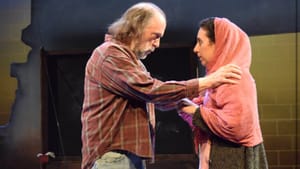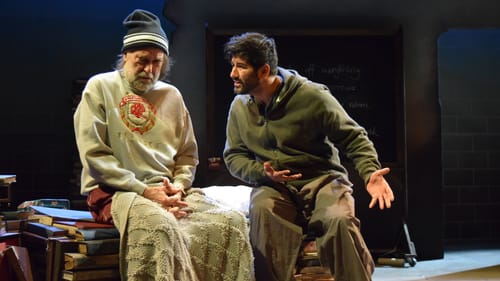Stay in the Loop
BSR publishes on a weekly schedule, with an email newsletter every Wednesday and Thursday morning. There’s no paywall, and subscribing is always free.
Looking for the heart of the matter
InterAct Theatre Company presents Gabriel Jason Dean’s ‘Heartland’

Cultural clashes, deceit, disease, death, and love—the makings of a satisfying night at the theater, wouldn’t you say? InterAct Theatre Company’s Heartland has it all, but Gabriel Jason Dean’s drama-deficient script favors ponderous faux complexity over developing actual human relationships. For a play about the intersections of family, faith, and friendship, the proceedings—like the characters who populate it, all teachers—remain frustratingly academic.
Back and forth
Evren Odcikin’s languorous production, performed on Dirk Durossette’s heavy-handed symbolist set, only furthers a sense of alienation between the lives onstage and our ability to connect, recognize, and empathize with them.
From the beginning, Heartland struggles to decide what it wants to be, awkwardly alternating between kitchen-sink drama and didactic political-issue play. In the end, Dean doesn’t settle on either genre, leaving his characters to vacillate between familiar banality and charged recriminations, with consequences that extend far beyond the comparatively small lives of people involved. The result causes an imbalance that keeps the viewer from fully investing in and appreciating the motivations forming the conflicting bonds at the play’s center.
From Nebraska to Afghanistan
The building blocks of compelling drama are in evidence from many perspectives. We meet Dr. Harold Banks (Tim Moyer) in precipitous mental decline—and in mourning for his adopted daughter Getee (Nazli Sarpkaya), killed in an attack on a school where she’d gone to work in her native Afghanistan. Getee’s colleague Nazrullah (Yousof Sultani) arrives on Harold’s doorstep in Nebraska—where he’s had a distinguished career as a scholar of Afghan language and culture—carrying his own share of secrets. Plenty becomes known over the play’s 100-minute running time, though few revelations actually move the proceedings toward something tangible for the viewer.

The audience learns what brought Harold to Afghanistan in the 1970s, and what prompted him to adopt Getee, who was made an orphan by the Russian war in that country. But a twist that paints Harold in a problematic light seems too neatly constructed for believability—and it fails to carry the proper weight, because the character is otherwise so thinly constructed. It helps matters little that Moyer’s performance, rife with bumbling academic stereotypes, feels thinly drawn.
Scenes between Getee and Nazrullah in Afghanistan, where they work at the same school, have greater emotional heft, though the playwright cannot resist introducing a romantic subplot that relies heavily on familiar tropes. (Not to mention a seduction that involves reading The Diary of Anne Frank—really, don’t ask.)
Missing the deeper issues
Yet as with the questions surrounding Harold’s past, Dean mostly punts on the deeper issues underpinning the action. Is the thoroughly American Getee engaging in cultural appropriation by returning to a country she barely remembers to instill Western values into her students? What kind of connection does Nazrullah feel to the country’s religiously influenced conservative beliefs?
Sarpkaya and Sultani do well to shade their parts with a sense of inner life, but the writing mostly sinks their efforts. And because the action takes place on the same unit set throughout, Odcikin struggles to demarcate the separate spheres of the story—between America and Afghanistan, freedom and compromise—and what they represent.
In a way, though, that blurriness is apt. Although the program lists a cultural consultant—likely a smart idea, given the playwright is a white man writing about a culture not his own—the work feels mostly grounded in a prevailing Western worldview, a fact the title drives home. Even as the action moves from country to country, its heart, mind, and perspective stay put.
What, When, Where
Heartland. By Gabriel Jason Dean, directed by Evren Odcikin. InterAct Theatre Company. Through April 14, 2019, at the Proscenium Theatre at the Drake, 302 S. Hicks Street, Philadelphia. (215) 568-8079 or interacttheatre.org.
The Drake Theatre complex is fully accessible. Wheelchair seating, companion seating, and mobility and audiovisual accessible seating is available for all performances. Seating requests can be made prior to the performance by calling (215) 568-8079 or emailing [email protected]. The Drake has gender-neutral restrooms.
Sign up for our newsletter
All of the week's new articles, all in one place. Sign up for the free weekly BSR newsletters, and don't miss a conversation.

 Cameron Kelsall
Cameron Kelsall